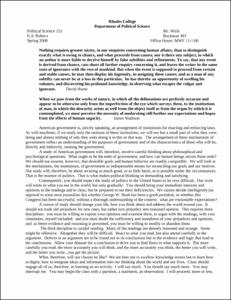Please use this identifier to cite or link to this item:
http://hdl.handle.net/10267/1470Full metadata record
| DC Field | Value | Language |
|---|---|---|
| dc.contributor.author | Wirls, Stephen | - |
| dc.date.accessioned | 2008-04-01T15:33:05Z | - |
| dc.date.available | 2008-04-01T15:33:05Z | - |
| dc.date.issued | 2008-04-01T15:33:05Z | - |
| dc.identifier.uri | http://hdl.handle.net/10267/1470 | - |
| dc.description | This syllabus was submitted to the Rhodes College Office of Academic Affairs by the course instructor. | en_US |
| dc.description.abstract | American government is, strictly speaking, an arrangement of institutions for enacting and enforcing laws. As with machines, if we study only the motions of these institutions, we will see but a small part of what they were doing and almost nothing of why they were doing it in this or that way. The arrangement of these mechanisms of government reflect an understanding of the purposes of government and of the characteristics of those who will be, directly and indirectly, running the government. A study of American government will, therefore, involve careful thinking about philosophical and psychological questions. What ought to be the ends of government, and how can human beings secure those ends? We should not assume, however, that desirable goals and human behavior are readily compatible. We will look at the mechanisms, the institutions, of government as indispensable means for reconciling our goals and our motives. Our study will, therefore, be about securing as much good, or as little harm, as is possible under the circumstances. That is the essence of politics. That is what makes political thinking so demanding and satisfying. Consequently, you should expect the study of politics in the United States to be very difficult. Our work will relate to what you see in the world, but only gradually. You should bring your immediate interests and opinions to the readings and to class, but be prepared to see their deficiencies. We cannot decide intelligently (as opposed to what most journalists do) whether George W. Bush has been a good president, or whether this Congress has been successful, without a thorough understanding of the context: what are reasonable expectations? A course of study should change your life, how you think about and address the world around you. It should not trade old prejudices for new ones, but rather turn prejudice into reasoned opinion. This requires three disciplines: you must be willing to expose your opinions and examine them, to argue with the readings, with your classmates, myself included; and you must doubt the sufficiency and soundness of your prejudices and opinions, and as better evidence and reasoning is presented, you must be willing to modify or abandon them. The third discipline is careful reading. Many of the readings are densely reasoned and strange. Some might be offensive. Altogether they will be difficult. React to what you read, but also attend carefully to the argument. Defects in an argument are to be found not in its conclusions but in the evidence and logic that lead to the conclusions. Allow your distaste for a conclusion to drive you to find flaws in what supports it. The more carefully you read, the more accurately you will think, and the more accurately you think, the better you will write, and the better you write...you get the picture. What, therefore, will our classes be like? We are here not to swallow knowledge stones but to learn how to digest, how to integrate ideas and information into our thinking about the world and our lives. Class should engage all of us, therefore, in learning as an activity. I will say much. You should say much more. You may interrupt me. You may begin the class with a question, a statement, an observation. I will proceed, more or less, according to the syllabus, but my aim is not simply to plow through it. If you are not satisfied with your grasp of the materials and problems, you should say so. If you are not satisfied or are confused, you are far from alone. Finally, learning is a continuous activity which should unite all of the individual aspects of your life here and beyond. More narrowly, you should not treat class time and office hours as wholly distinct things. Some of the best and most enjoyable learning occurs one-on-one. If you have a question, something you want to discuss, whatever, come for a visit. You will be welcomed. | en_US |
| dc.language.iso | en_US | en_US |
| dc.publisher | Memphis, Tenn. : Rhodes College | en_US |
| dc.relation.ispartofseries | Syllabi CRN | - |
| dc.relation.ispartofseries | 28624 | - |
| dc.rights | Rhodes College owns the rights to the archival digital images in this repository. Images are made available for educational use only and may not be used for any non-educational or commercial purpose. Approved educational uses include private research and scholarship, teaching, and student projects. For additional information please contact archives@rhodes.edu. Fees may apply. | - |
| dc.subject | Political Science, Department of | en_US |
| dc.subject | Syllabus | en_US |
| dc.subject | Curriculum | en_US |
| dc.subject | Academic departments | en_US |
| dc.subject | Text | en_US |
| dc.subject | 2008 Spring | en_US |
| dc.title | POLS 151-01, United States Politics, Spring 2008 | en_US |
| dc.type | Syllabus | en_US |
| Appears in Collections: | Course Syllabi | |
Files in This Item:
| File | Description | Size | Format | |
|---|---|---|---|---|
| 2008_sp_POLS_151-01_28624.pdf | 46.18 kB | Adobe PDF |  View/Open |
Items in DSpace are protected by copyright, with all rights reserved, unless otherwise indicated.